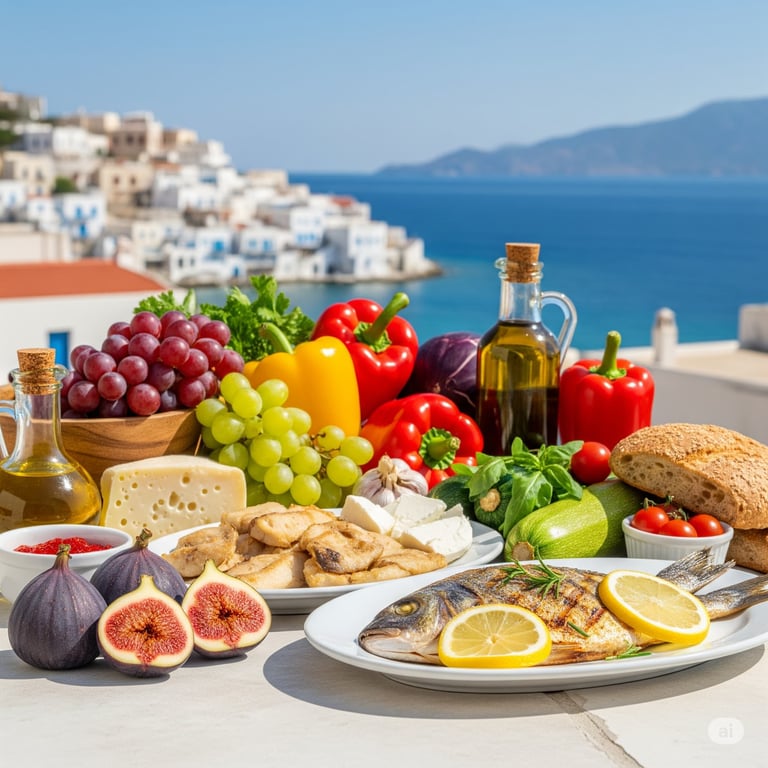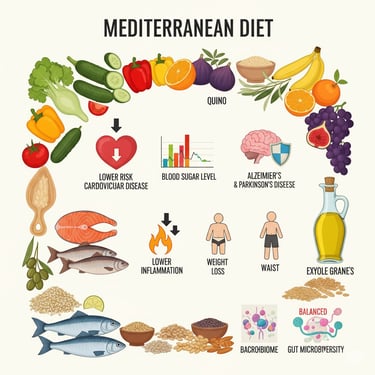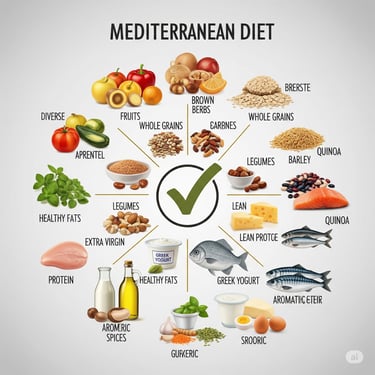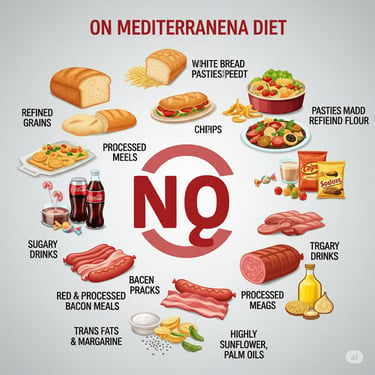The Mediterranean Diet: A Doctor’s Guide to Eating for Health, Longevity, and Fitness
Blog post description.


As a physician and fitness advocate, I’m often asked a seemingly simple question: “What’s the best diet for long-term health?” While no one-size-fits-all approach exists, the Mediterranean diet consistently stands out for its scientifically proven benefits — not only for heart health and diabetes prevention but also for sustainable weight management and improved longevity.
So, what exactly is the Mediterranean diet, and should you consider following it? Let’s break it down.
What Is the Mediterranean Diet?
The Mediterranean diet is inspired by the traditional eating patterns of countries bordering the Mediterranean Sea — particularly Greece, Italy, and parts of Spain and southern France. It’s not just a diet but a lifestyle rooted in fresh, whole foods, mindful eating, and physical activity.
Instead of counting calories or cutting out entire food groups, the Mediterranean diet emphasizes quality over quantity, and focuses on whole, minimally processed foods.
Who Should Follow the Mediterranean Diet?
The answer is: almost everyone.
This way of eating is particularly beneficial for:
People with heart disease or risk factors like hypertension, high cholesterol, or a family history
Individuals with type 2 diabetes or prediabetes
Those aiming for sustainable weight loss
Anyone seeking to improve gut health, reduce inflammation, or boost energy levels
Even athletes and fitness enthusiasts benefit from the diet’s anti-inflammatory and nutrient-dense profile — promoting muscle recovery, metabolic health, and steady energy.
Health Benefits: Backed by Science
The Mediterranean diet has been extensively studied and linked to:
Lower risk of cardiovascular disease and stroke
Improved blood sugar control
Reduced incidence of Alzheimer’s and Parkinson’s disease
Lower inflammatory markers
Weight loss and waist circumference reduction
Better gut microbiome balance
It’s not a fad — it’s a long-standing, evidence-based nutritional pattern.
What to Eat: The Mediterranean Essentials
Here’s what forms the backbone of the Mediterranean diet:
✅ Fruits and vegetables – Aim for variety and color
✅ Whole grains – Brown rice, oats, barley, quinoa
✅ Legumes and beans – Lentils, chickpeas, black beans
✅ Healthy fats – Especially extra virgin olive oil, nuts, and seeds
✅ Fish and seafood – At least twice a week (salmon, sardines, mackerel)
✅ Dairy in moderation – Preferably Greek yogurt and cheese
✅ Lean poultry and eggs – Weekly, in place of red meat
✅ Herbs and spices – Replace salt with flavor from oregano, basil, turmeric, garlic
And of course — drink plenty of water, and enjoy a glass of red wine in moderation if it fits your lifestyle.
What to Avoid or Limit
The Mediterranean diet doesn’t ban foods, but it recommends minimizing or avoiding:
🚫 Refined grains – White bread, pastries, pasta made from refined flour
🚫 Processed foods – Chips, fast food, frozen ready meals
🚫 Sugary drinks and snacks – Soda, candy, packaged desserts
🚫 Red and processed meats – Sausages, bacon, hot dogs
🚫 Trans fats and margarine – Common in baked goods and fried foods
🚫 Highly processed oils – Like soybean, sunflower, and palm oils
Avoiding these not only supports heart health but also improves insulin sensitivity, digestion, and energy levels.
A Simple Mediterranean Sample Meal Plan
Here’s a one-day sample meal plan to help you visualize how to structure your day:
🥣 Breakfast
Greek yogurt topped with sliced strawberries, walnuts, and a drizzle of honey
A slice of whole-grain toast with mashed avocado
Black coffee or green tea
🥗 Lunch
Quinoa salad with cherry tomatoes, cucumber, chickpeas, red onion, and feta
Dressed with olive oil, lemon juice, and fresh herbs
A handful of olives on the side
🍎 Snack
An apple with a tablespoon of almond butter
Or a small bowl of hummus with carrot and cucumber sticks
🐟 Dinner
Grilled salmon drizzled with lemon and herbs
Steamed spinach sautéed in olive oil with garlic
A small serving of wild rice or roasted sweet potato
Optional: A glass of red wine
🍇 Dessert (Optional)
A few pieces of dark chocolate (70% or higher)
Or a bowl of fresh berries with a sprinkle of chia seeds
Final Thoughts: Make It a Lifestyle, Not a Diet
What makes the Mediterranean diet sustainable is its flexibility and satisfaction factor. You’re not starving yourself or cutting out carbs — you’re nourishing your body with real, wholesome food. Combine this eating style with regular movement, good sleep, and mindful eating, and you’ve got a recipe for vibrant health.
As a doctor and someone who values fitness, I can confidently say this is one of the best long-term strategies for disease prevention, body composition, and overall wellness. Whether you’re starting fresh or refining your habits, the Mediterranean diet is a delicious, scientifically backed foundation to build on.
Ready to get started? Start by making one change: swap your cooking oil for extra virgin olive oil, or add one more serving of veggies to your meals. Small steps — big impact.






